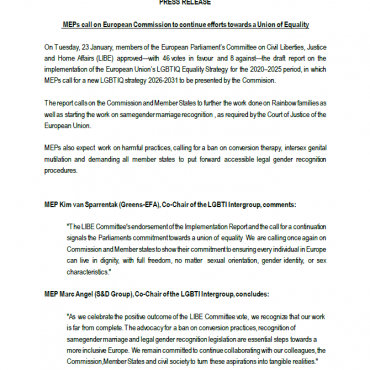New EU data protection law: MEPs want to protect LGBT people’s privacy
Today, the European Parliament adopted two new laws at first reading to reform data protection in the European Union.
 Until now, the EU regulated data protection via a 1995 directive, ill fitted for the modern omnipresence of personal data. The European Commission proposed a new EU framework in the form of two legal texts: a directive and a regulation.
Until now, the EU regulated data protection via a 1995 directive, ill fitted for the modern omnipresence of personal data. The European Commission proposed a new EU framework in the form of two legal texts: a directive and a regulation.
The European Parliament adopted several amendments to these two proposals. They include measures to protect private information relating to individuals’ sexual orientation and gender identity.
MEPs specified that “the processing of personal data, revealing race or ethnic origin, political opinions, religion or philosophical beliefs, sexual orientation or gender identity […] shall be prohibited” (article 9 in the regulation). Narrow exceptions are foreseen.
The new rules adopted today add that profiling, i.e. classifying individuals based on their personal characteristics, “shall be prohibited” when it “has the effect of discriminating against individuals on the basis of race or ethnic origin, political opinions, religion or beliefs, trade union membership, sexual orientation or gender identity” (article 20 in the regulation).
Jan Albrecht MEP, Member of the LGBT Intergroup and author of the resolution adopted today, reacted: “The Charter of Fundamental Rights clearly establishes individuals’ right to see their personal data protected, and this new regulation does just that.”
“It’s crucially important that individuals don’t see their personal characteristics used against their will—including sexual orientation and gender identity.”
Sirpa Pietikäinen MEP, Vice-President of the LGBT Intergroup added: “I’m extremely happy these new rules explicitly mention sexual orientation and gender identity. National governments must now follow the Parliament’s lead, and show they value their citizens’ personal data.”
The Council of the European Union, gathering the EU’s 28 national governments, must now adopt its own amendments to the proposals.
Image credit: © European Union






